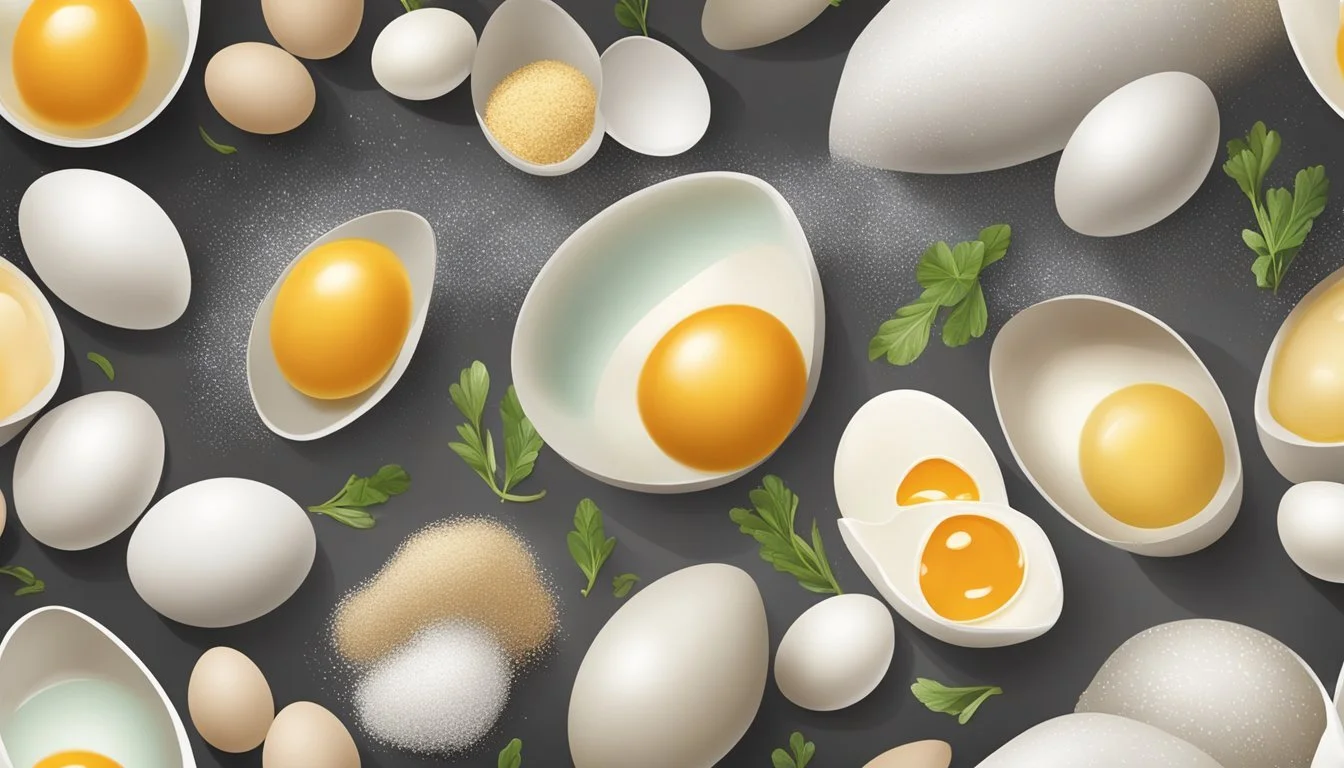How to Substitute Duck Eggs for Chicken Eggs
A Simple Guide for Bakers
When it comes to baking and cooking, eggs are a fundamental ingredient in many recipes, serving as a binder, leavening agent, and a way to add moisture. Chicken eggs are the standard choice for most households, but for those looking to try something different or for those who raise their own poultry, duck eggs are a flavorful and larger alternative that can be used in place of chicken eggs.
Duck eggs are renowned for their rich flavor and larger size, which can make a difference in recipes. When making the substitution, it’s important to recognize the differences in size and content between duck and chicken eggs. Generally, two duck eggs can replace three large chicken eggs. However, adjustments may need to be made depending on the size of the duck egg compared to that of a chicken egg.
It's also worth noting that the composition of duck eggs can affect the outcome of your dish. They have a higher fat content and a larger yolk, which can contribute to a richer flavor and texture. Moreover, the whites of duck eggs contain more protein, which can result in a fluffier and slightly higher rise in baked goods. When using duck eggs in recipes, it's recommended to start with a straight substitution and then adjust as necessary, taking into account their distinct characteristics.
Understanding Eggs
When substituting eggs in recipes, it is important to understand the differences in composition and the unique characteristics of duck and chicken eggs to make appropriate adjustments.
Egg Composition
Eggs, in general, are comprised of the yolk, the white (albumen), and the shell. Chicken eggs are widely used in cooking and baking. These eggs provide essential nutrients such as protein, cholesterol, fat, vitamins including Vitamin A, minerals, and omega-3 fatty acids. The yolk contains most of the egg's calories, fat, and cholesterol, while the white provides primarily protein.
Duck Eggs Vs. Chicken Eggs
Duck eggs are often larger in size than chicken eggs, which can impact the quantity needed for substitution in recipes. They have a larger yolk relative to their size, leading to a richer flavor and texture when used in culinary applications. Duck eggs also boast a higher fat content and higher protein content compared to chicken eggs. Moreover, their shell is thicker, which contributes to a longer shelf life. When considering the nutritional aspect, duck eggs contain more calories, fat, and cholesterol but are also a richer source of omega-3 fatty acids and vitamin A.
Here is a comparison table to illustrate these differences:
Attribute Duck Eggs Chicken Eggs Size Larger Smaller Yolk Larger with richer flavor Smaller Fat Higher Lower Protein Higher Lower Cholesterol Higher Lower Calories More Fewer Omega-3 Fatty Acids Higher Lower Vitamin A More Less Shell Thicker Thinner
Understanding the difference between duck eggs and chicken eggs is key to successful substitution in recipes, allowing for adjustments to achieve the intended taste and texture of the dish.
Choosing Duck Eggs
When selecting duck eggs for substitution in recipes, individuals should consider both the source and quality of the eggs.
Where to Buy Duck Eggs
Duck eggs can be somewhat more elusive than chicken eggs, but they are often available at specialty grocery stores, farmers' markets, and directly from duck farms. They might be more expensive due to their relative rarity and the higher cost of production. Here are common places to find duck eggs:
Farmer’s Markets: They often offer the freshest options as they come directly from local farmers.
Specialty Grocery Stores: Health food stores and upscale grocery stores may carry them.
Asian Markets: Duck eggs are commonly used in many Asian cuisines, so these markets might have them in stock.
Online Retailers: Some farms sell duck eggs directly to consumers via their websites.
Evaluating Quality and Freshness
The quality of duck eggs is paramount, and there are several indicators one can check:
Shell appearance: Fresh duck eggs have a clean, unblemished shell with a slight sheen. Minor variations in shell color are normal, but cracks or unusual spots can signify aging or poor handling.
Inner quality: Upon cracking, the yolk should be bright and robust, and the white should be clear and viscous, indicating freshness.
Sell-by date: Always check the packaging for a sell-by or use-by date when purchasing from grocery stores.
Preparation Basics
When substituting duck eggs for chicken eggs in recipes, it's crucial to understand the differences in preparation, especially in terms of handling, storing, and beating the eggs to achieve the best results.
Handling and Storing
Duck eggs have a thicker shell compared to chicken eggs, which contributes to a longer shelf life. They should be stored in a cool, dry place, ideally in the refrigerator. When preparing duck eggs for cooking or baking, one should remember that their larger size might affect the ratio in recipes; typically two duck eggs can replace three large chicken eggs. This adjustment ensures that the balance of moisture and binding properties in the dish is maintained.
Beating Duck Eggs
To beat duck eggs, start by cracking them into a clean bowl. Due to their larger yolk and higher protein content, duck eggs will produce a richer color and potentially a denser texture. When beating the egg whites, it’s important to note that they may require a slightly longer time to reach the desired consistency compared to chicken egg whites. The extra beating time is especially relevant when preparing meringues or other dishes where the texture of beaten egg whites is crucial. Use a whisk or an electric beater for an even and smooth texture.
Cooking and Baking Techniques
When substituting duck eggs for chicken eggs in recipes, it's important to acknowledge the differences in size and composition. These elements can affect the texture, structure, and flavor of various dishes, from baked goods to breakfast favorites.
Adjusting Baking Recipes
In baking, precision is key. Duck eggs are approximately 30% larger than chicken eggs, which means adjustments are necessary to maintain balance in recipes. For every three large chicken eggs a recipe requires, cooks can generally use two duck eggs. The higher fat and protein content in duck eggs can contribute to a richer, denser texture in baked goods.
For gluten-free baking, the increased protein in duck eggs can offer a better structure to cakes (how long do cakes last?) and breads which often lack gluten to provide it. Below are some typical adjustments:
Cakes and Muffins: Use 1 duck egg for every 1 chicken egg for moister, richer results.
Breads: Reduce the water or liquid content slightly when using duck eggs to prevent a too-dense texture.
Consider beating duck egg whites until frothy before folding into the batter to incorporate air and achieve a lighter result in sponge cakes or soufflés.
Cooking Duck Eggs for Breakfast
Duck eggs bring a unique flavor to traditional breakfast dishes. Their richer taste makes scrambled eggs, omelets, frittatas, and quiches (What wine goes well with quiche?) stand out. Due to their larger size, duck eggs have more yolk to white ratio, which leads to a creamier texture in scrambled eggs or omelets.
For frying duck eggs, one needs to cook them on a lower heat than chicken eggs due to their larger size and thicker shell. Here's how to cook some typical breakfast egg dishes:
Scrambled and Omelets: Cook on a lower heat to allow the egg to set without becoming rubbery.
Hard-Boiled: Place eggs in cold water, bring to a boil, then remove from heat and let sit for 9-12 minutes.
Poached and Soft-Boiled Egg: Due to the thicker shell and membrane, they may require a longer cooking time than chicken eggs.
In each preparation, whether it's frying up an omelet or crafting a frittata, keeping an eye on cooking times and temperature will help ensure that the qualities of the duck egg are showcased without overcooking.
Duck Eggs in Everyday Recipes
When incorporating duck eggs into everyday recipes, one should take into account their larger size and richer taste. These eggs offer a distinctive flavor profile and can be a versatile substitute in various dishes, particularly in baking where their higher fat content can lean towards more richness and moisture.
Cookies and Desserts
Ratio for Substitution:
For most cookie and dessert recipes, you can substitute chicken eggs with duck eggs using a 2:3 ratio, meaning two duck eggs for every three chicken eggs.
Baking Benefits:
Due to their larger yolks and higher fat content, duck eggs provide added richness and moisture to desserts, making them especially good for dense and moist cookies or cakes.
Savory Dishes
General Tips for Using Duck Eggs:
The robustness of duck eggs stands up well in savory dishes, where their unique flavor can shine through.
It's often best to use them in recipes where the egg is the star, such as in quiches or omelets.
Cooking Adjustments:
For hard-boiled duck eggs, a cooking time of about 9 to 12 minutes is recommended after the water has reached a boil.
In soft-boiled applications, reduce the cooking time to 6 to 7 minutes for a creamy yolk, excellent for use in savory dishes like ramen or to top toast.
By making minor adjustments, one can successfully integrate duck eggs into a plethora of recipes ranging from sweet to savory, all while enriching the dish with a delightful touch of culinary uniqueness.
Health and Nutrition
When considering the health and nutritional aspects of substituting duck eggs for chicken eggs in recipes, it's important to look at the content of various nutrients. Duck eggs are larger, which contributes to their higher nutrient content in absolute terms.
Nutrient Duck Eggs Chicken Eggs Fat Higher Lower Protein Higher Lower Cholesterol Higher Lower Calories Higher Lower Omega-3s More Less Vitamin A More Less Minerals More diverse Less diverse
Duck eggs have a higher fat content, which includes beneficial fats like omega-3 fatty acids. The protein content in duck eggs is also higher, making them a robust source of this essential macronutrient. It's noteworthy that both the amount of cholesterol and calories are greater in duck eggs.
For minerals, duck eggs provide a richer source, including iron and phosphorus. They also have more vitamin A, which is vital for immune function and eye health. Individuals requiring a nutrient-dense diet may find duck eggs especially beneficial due to their higher concentrations of these nutrients. However, those watching their cholesterol levels should be mindful of the increased amount present in duck eggs.
By choosing to substitute duck eggs, one can enhance the nutritional value of a dish, though the specific differences in nutritional content should be factored into one's overall dietary needs. It is essential to adjust portions accordingly, given the larger size and greater nutrient density of duck eggs.





